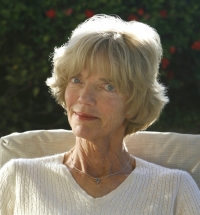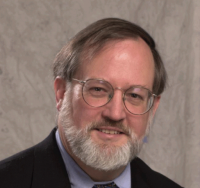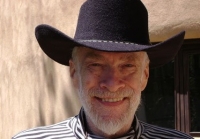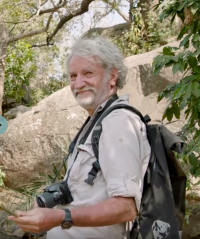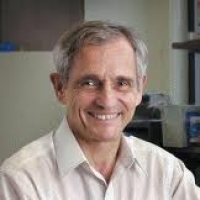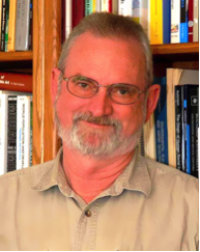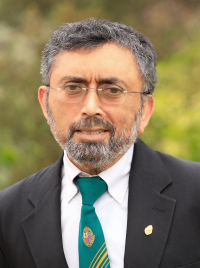The Evolution of Human Altruism
Biographical Sketches: Co-Chairs
University of California, San Diego
Patricia Smith Churchland is a neurophilosopher, now retired from the University of California San Diego, and an Adjunct Professor at the Salk Institute. She focuses on how discoveries in neuroscience impact traditional ideas about ourselves and how philosophers can usefully collaborate with scientists. She wrote the pioneering book, Neurophilosophy (MIT Press, 1986), and is co-author with T. J. Sejnowski of The Computational Brain (MIT Press, 1992). Her current work focuses on morality and the social brain: Braintrust: What Neuroscience tells us about Morality (Princeton University Press, 2011) and Conscience: The Origins of Moral Intuition (W. W. Norton & Company, 2019). She won a MacArthur Prize in 1991, the Rossi Prize for neuroscience in 2008, and the Prose Prize for science for Braintrust.
Extended interviews can be found on YouTube, The Science Network, and on Serious Science.
Arizona State University
Randolph M. Nesse is a professor of life sciences and an Arizona Foundation Professor at Arizona State University, where he moved in 2014 to become the founding director of the Center for Evolution, Medicine, & Public Health. He took his undergraduate degree at Carleton College, and his medical training at the University of Michigan. He is a board certified psychiatrist and distinguished fellow of the American Psychiatric Association who treated patients and conducted research at one of the world’s first anxiety disorders clinics that he helped to start in conjunction with his early research on the neuroendocrinology of anxiety. His studies on the origins of senescence led to a deep commitment to evolutionary biology. Nesse collaborated with George Williams on several early works in Darwinian Medicine, including "The Dawn of Darwinian Medicine" in The Quarterly Review of Biology (1991) and the book Why We Get Sick: The New Science of Darwinian Medicine (Vintage, 1995). He is executive editor of The Evolution and Medicine Review, and president of the Foundation for Evolution, Medicine & Public Health. Dr. Nesse's primary current research focus is on how selection shapes mechanisms that regulate defenses such as pain, fever, anxiety and low mood. His work emphasizes the utility of negative emotions, and how a signal detection analysis (the "smoke detector principle") explains why defense expression so often seems excessive. His work shows that low mood is useful to disengage effort from unreachable goals, and that failure to disengage often leads to depression. Closely related is his work on how runaway social selection can shape human capacities for altruism, empathy, and complex sociality that are otherwise difficult to explain, the topic of a recent CARTA symposium. Dr. Nesse’s main mission in his new position at ASU is to establish evolutionary biology as a basic science for medicine, worldwide. He will be recruiting new faculty for the Center, creating new education programs online and at ASU, and helping to coordinate widely dispersed efforts at many universities to apply evolutionary principles to medicine and public health. He is especially eager to make contact with physicians and researchers who share these interests.
Professor Emerita, University of California, Davis
Sarah B. Hrdy is Professor Emerita at the University of California, Davis. A former Guggenheim fellow, she has been elected to the National Academy of Sciences, the American Academy of Arts and Sciences, the California Academy of Sciences, the American Philosophical Society and the American Association for the Advancement of Science. She is the author of six books including The Black-man of Zinacantan: A Central American Legend (University of Texas Press, 1972); The Langurs of Abu: Female and Male Strategies of Reproduction (Harvard University Press, 1977) the first book to examine the reproductive strategies of nonhuman primates from the perspective of both sexes; The Woman that Never Evolved (Harvard University Press, 1981, new edition 1999) selected by the New York Times as one of the Notable Books of the Year; and Mother Nature: A History of Mothers, Infants and Natural Selection (Pantheon, 1999), which won the Howells Prize for Outstanding Contribution to Biological Anthropology and was chosen by both Publisher’s Weekly and Library Journal as one of the “Best Books of 1999", Mothers and Others (Belknap Press of Harvard, 2009), a book about the role of alloparental care and provisioning of young (cooperative breeding) in the emergence of "emotionally modern" humans which was awarded both the Howells Prize and the Staley Prize, and Father Time (Princeton University Press, 2024). She is also co-editor of Infanticide: Comparative and Evolutionary Perspectives (Taylor and Francis Group, 1984), selected by Choice as one of the "Outstanding Academic Books" for 1984, and co-editor with Sue Carter and others of Attachment and Bonding: A new Synthesis (The MIT Press, 2005). Hrdy edited the Foundations of Human Behavior series from 1985-96 and continues to serve on editorial boards for Evolutionary Anthropology and Human Nature. She lives with her husband Dan, a retired medical professor and currently a walnut grower, on their farm in northern California.
Biographical Sketches: Speakers
University of Southern California
Christopher Boehm (1931-2021) was a professor of biological sciences and anthropology at University of Southern California, and was director of the Goodall Research Center. He was a recipient of fellowships from the Simon Guggenheim Foundation and the School of Advanced Research, and was been awarded the Stirling Prize in Psychological Anthropology. Boehm did fieldwork with Navajo Indians, tribal Serbs in Montenegro, and wild chimpanzees working at Gombe National Park. His interests included political and moral evolution, and hunter-gatherer sociopolitics. He developed a large-scale database on these foragers.
Max Planck Institute for Evolutionary Anthropology
Christophe Boesch was a professor and director emeriti of the Max Planck Institute for Evolutionary Anthropology, Department of Primatology, and founder of the Taï Chimpanzee Project, before his passing in January 2024.
His research took an inclusive approach, addressing from many different points of view, the biology of the chimpanzees and used this contribution to improve our understanding of the evolution of human and its cognitive and cultural abilities. From the start, he adopted a field worker approach, whereby he went in the field and studied the chimpanzees, and more recently gorillas, in their natural habitats to understand their flexible adaptations, and then took this knowledge to address questions about “what makes us humans?”
Boesch worked most recently on the following areas (in his own words):
1- Evolution of cooperation: Chimpanzee’s territorial and hunting behaviour are demonstrably part of the most elaborate forms of cooperation seen in animal species. After having worked for years on the hunting behaviour of the Taï chimpanzees and tried to elucidate the factors explaining the important population differences observed in this behaviour, I am now turning my focus on the territorial behaviour and the complex cooperative strategies that are observed in this context. Our long-term data based on synchronous observations on 3 different communities of chimpanzees in the Taï forest will be the base of this analysis.
2- Evolution of culture and tool use: Humans have long been proposed to be the only species having culture. However, the ever increasing data collected on wild animal population are challenging this view. Chimpanzee’s culture has been a central aspect of my research as this will allow us to gain much insight into what is special in human cultural abilities. I documented and studied the acquisition of tool use in Taï chimpanzees illustrating the important for tools in the life of this species. Recently we have expanded our field work in Central Africa to expand our knowledge on the behaviour of chimpanzees in this region that have remained surprisingly unstudied until today. This will allow us to dramatically increase our knowledge of the breadth of cultural variation existing in chimpanzees.
3- Evolution of reproductive strategies: The development of new technologies to work non-invasively to do genetic studies with wild animals has been a important extension of our research leading to many new insights into the reproductive strategies of chimpanzees as well as a more complete understanding of some of the reasons for the existence of social dominance and the role of kinship within the social group. Despite the presence of a fission-fusion society and many adult males reproducing, paternal behaviour could be demonstrated in Taï chimpanzees.
4- Population dynamic in wild chimpanzees: Long-term projects allow following the variations in population size and structure. We have been able to collect many data on that aspect in Taï chimpanzees and invested a lot of time in pinning down the causes of mortality in this population. This has led me to develop a large collaboration with the Robert Koch Institute trying to find the often unknown pathogens that are responsible for their death and elucidating the transmission mechanisms that lead to their contamination.
UC Irvine
Steven A. Frank is Donald Bren Professor and UCI Distinguished Professor in the School of Biological Sciences at the University of California, Irvine. His areas of expertise are evolutionary genetics, host-parasite interactions and social evolution.
Frank received a BS in biology from the University of Michigan, master’s degrees in statistics and zoology from the University of Florida, and a PhD in biology from the University of Michigan.
Frank develops mathematical, computational, and conceptual models to study natural selection and the evolution of organismal design. His work makes testable predictions on topics ranging from microbial life history to sociality to cancer. His study of particular topics leads to syntheses of natural selection, robustness in relation to biological design, and the commonly observed patterns that emerge from information flow and scale. Current projects: (1) Microbial life history: the fundamental forces of biological design, (2) Evolution of regulatory control, and (3) Invariance and the common patterns of nature.
Humboldt University Berlin
Rockefeller University
Donald Pfaff is a professor of neurobiology and behavior at The Rockefeller University, in New York. He graduated magna cum laude from Harvard College and received his Ph.D. from MIT. He is a Fellow of the American Academy of Arts and Sciences (elected 1992) and a Member of the National Academy of Sciences (elected 1994). His lab specializes in brain mechanisms underlying social behaviors, with an emphasis on molecular and electrophysiological mechanisms that underlie hormone effects on nerve cells. Pfaff is the author of several books on the brain and behavior. He received the 2005 Award for Excellence in Professional and Scholarly Publishing (medical science category) of the Association of American Publishers for his book, Brain Arousal and Information Theory (Harvard University Press, 2006). He has been the recipient of a National Institutes of Health MERIT Award.
University of California, Davis
Peter J. Richerson is a Distinguished Professor Emeritus in the Department of Environmental Science and Policy at the University of California—Davis. His research focuses on the processes of cultural evolution. His 1985 book with Robert Boyd, Culture and the Evolutionary Process, applied the mathematical tools used by organic evolutionists to study a number of basic problems in human cultural evolution. His 2005 book with Boyd, Not By Genes Alone: How Culture Transformed Human Evolution, is an introduction to cultural evolution aimed at a broad audience. His recent publications try to understand some of the main events in human evolution, such as the evolution of the advanced capacity for imitation that makes possible our complex languages, technologies and societies, the origins of agriculture, and the evolution of modern behavior.
UC San Diego School of Medicine
Ajit Varki is a Distinguished Professor of Medicine and Cellular & Molecular Medicine, Emeritus Co-Director of CARTA, Emeritus Co-Director of the Glycobiology Research and Training Center at UC San Diego, and Adjunct Professor at the Salk Institute. He received basic training in physiology, medicine, biology, and biochemistry at the Christian Medical College (CMC), Vellore, The University of Nebraska, and Washington University in St. Louis. He also has formal training and board certification in internal medicine, hematology, and oncology. Varki is the executive editor of Essentials of Glycobiology (Cold Spring Harbor Press, 4th Edition, 2022) and is recipient of a MERIT award from the NIH, and an American Cancer Society Faculty Research Award. Honorific elections include the American Academy of Arts and Sciences, the National Academy of Medicine, the American Society for Clinical Investigation, and the Association of American Physicians. He is also recipient of the three highest honors in his field, the Karl Meyer Award of the Society for Glycobiology, the International Glycoconjugate Organization Award and the Rosalind Kornfeld Award for Lifetime Achievement in Glycobiology. He is recognized for creating the first major open access research journal (J. Clin. Invest., 1996) as well as the first major open access textbook (Essentials of Glycobiology, 2009). He was honored with the Old Cottonian of Eminence Award at the 150th Anniversary of Bishop Cotton Boys School, Bangalore, India, (2015) as well as a Distinguished Faculty Medal and Oration at his medical school alma mater, CMC, Vellore. Significant past appointments include: Co-Head, UC San Diego Division of Hematology-Oncology; President of the Society for Glycobiology; Editor-in-Chief of the Journal of Clinical Investigation; Interim Director of the UC San Diego Cancer Center, President of the American Society for Clinical Investigation, and UC San Diego Associate Dean for Physician-Scientist Training. Varki's research interests are focused on a family of cell surface sugars called sialic acids, and their roles in biology, evolution and disease. Currently, active projects are relevant to the roles of sialic acids in microbial infectivity, the regulation of the immune response, the progression and spread of tumors, aging, and unique aspects of human evolution. His group is particularly intrigued to find multiple interrelated differences in sialic acid biology between humans and our closest evolutionary cousins, the "great apes." These differences are a signature of the events that occurred during the last few million years of human evolution, and appear to be relevant to understanding several aspects of the current human condition, both in health and disease. Varki’s book, Denial (Twelve, Hachette Books, 2013), explores a novel "Mind Over Reality Transition” (MORT) theory that denying reality and personal mortality was a key step in allowing the emergence of a full theory of mind, and in the origin of our species.
